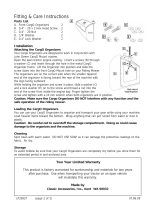
iii
Important information about your Scion
Occupant restraint systems
Scion encourages you and your family to take the time
to read Section 1–3 of this Owner’s Manual carefully. In
terms of helping you understand how you can receive
the maximum benefit of the occupant restraint systems
this vehicle provides, Section 1–3 of this Owner’s Manu-
al is the most important section for you and your family
to read.
Section 1–3 describes the function and operation con-
cerning seats, seat belts, SRS airbags and child re-
straint systems of this vehicle and some potential haz-
ards you should be aware of. These systems work to-
gether along with the overall structure of this vehicle in
order to provide occupant restraint in the event of a
crash. The effect of each system is enhanced when it is
used properly and together with other systems. No
single occupant restraint system can, by itself, provide
you or your family with the equal level of restraint which
these systems can provide when used together. That is
why it is important for you and your family to under-
stand the purpose and proper use of each of these
systems and how they relate to each other.
The purpose of all occupant restraint systems is to help
reduce the possibility of death or serious injury in the
event of a collision. None of these systems, either indi-
vidually or together, can ensure that there is no injury in
the event of collision. However, the more you know
about these systems and how to use them properly, the
greater your chances become of surviving an accident
without death or serious injury.
Seat belts provide the primary restraint to all occupants
of the vehicle, and every occupant of the vehicle should
wear seat belts properly at all times. Children should
always be secured in child restraint systems that are
appropriate for their age and size. SRS (Supplemental
Restraint System) airbags are, as their names imply,
designed to work with, and be supplemental to, seat
belts and are not substitutes for them. SRS airbags can
be very effective in reducing the risk of head and chest
injuries by preventing contact of the head and chest with
interior portions of the vehicle.





















